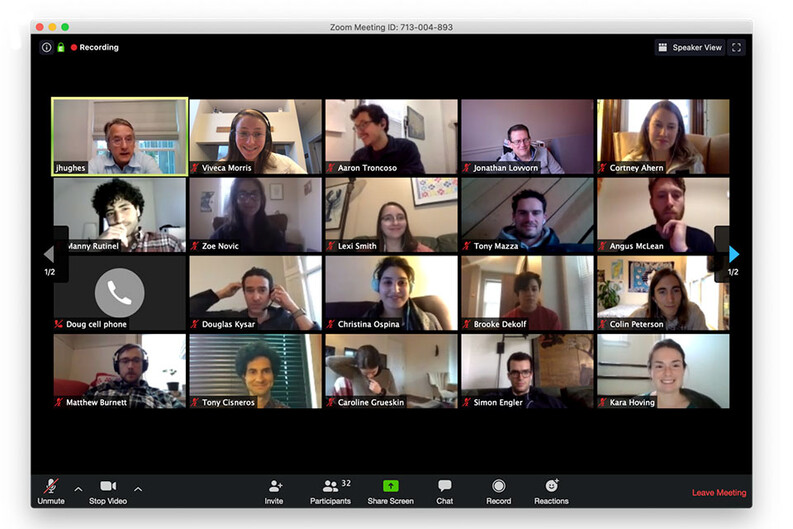John Hughes Discusses North Carolina Hog Nuisance Lawsuits

The Law, Ethics & Animals Program (LEAP) at Yale Law School hosted attorney John Hughes to discuss his firm’s high-profile cases against Murphy-Brown, a subsidiary of Smithfield Foods, on behalf of North Carolina communities harmed by hog confined animal feeding operations (CAFOs). Hughes’s visit, which took place over Zoom on March 23, 2020, was part of LEAP’s new Climate, Animal, Food and Environmental Law and Policy Lab (CAFE Lab). It also marked the first session of CAFE Lab held online after Yale moved the spring semester to a distance learning format in light of the global COVID-19 pandemic.
Hughes described the history, impacts, and outsized political influence of the industrial hog industry in North Carolina. In rural areas in the state’s east, many low-income families and communities of color suffer from living in close proximity to massive swine operations due to noxious odors from untreated hog waste lagoons, heavy traffic of trucks transporting hogs, and ammonia and other contaminants released into the air and water.
Hughes’ law firm, Wallace & Graham, along with co-counsel, represented 36 residents in Federal Court who were negatively impacted, ultimately winning verdicts of nearly $550 million for the plaintiffs in five trials in 2018–2019. In all five trials, unanimous juries held Smithfield — the world’s largest pork producer — liable for interfering with the residents’ use and enjoyment of their homes. The third jury verdict was the largest damages award in North Carolina’s history. (The court reduced the awards to just under $100 million because of a state law capping punitive damages. Smithfield is appealing the verdicts.)
The CAFE Lab is made up of students from across Yale’s campus, including the Law School, the School of Forestry & Environmental Studies, the School of Public Health, and the School of Management. This multidisciplinary approach to advancing systemic change to the food industry was echoed in Hughes’s guest lecture, as he shared the complexity behind the successful swine farm litigation, and the diverse expertise required to win the case from not only lawyers, but also environmental engineers and epidemiologists.
Hughes emphasized to students the importance of incorporating sound scientific evidence from varied fields, understanding linkages and conflicts between academia and industry, the critical process of jury selection, and the need for deep comprehension and tactfulness in navigating both the local and federal court system.
Hughes also described how the lawsuits spurred a legislative backlash from the state’s agricultural lobby. After the first successful ruling in April 2018, the North Carolina legislature amended its right-to-farm law to limit the maximum damages that plaintiffs can receive and to expand producer protections. The amendments dramatically reduce the financial incentive to bring similar suits.
“The North Carolina hog CAFO litigation is an epic David versus Goliath tale which holds many lessons for the Lab. Two in particular are the importance of an independent judiciary and tort law to ensure industry accountability, and the central role of lawyers like John Hughes and his colleagues in making that system of accountability available to the harmed and powerless,” said LEAP faculty co-director Doug Kysar.
The Law, Ethics & Animals Program (LEAP) is a new initiative at Yale Law School that leads and coordinates a diverse program of activities. It seeks to contribute to defining, expanding, and advancing the field of animal law. Spring 2020 marks the first semester of the CAFE Law and Policy Lab.
By Cortney Ahern


